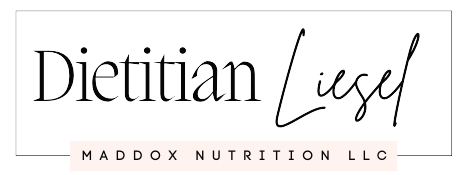
Supporting your eating disorder recovery journey for lasting freedom and healing.
I believe that full and lasting recovery from an eating disorder is possible. I’m here to help you along the way.
I practice from a non-diet and weight neutral perspective, which means I do not provide intentional weight loss strategies or view foods as “good” or “bad.” I help my clients embrace all foods as morally equal and integrate intuitive eating principles when appropriate for your stage of recovery.
I am a Health at Every Size (HAES) aligned practitioner, which means I believe that all bodies are worthy of equal treatment in health care and that weight is only one small piece of the big puzzle that is health.
When requested, I am happy to incorporate a Christian faith-based approach to your nutrition treatment to help you embrace God’s good design for your body and food.
My nutrition philosophy…

What to expect when working with me:
The first step is an initial nutrition assessment, typically 60-90 minutes, where I’ll gather more information about your eating disorder journey, health history, and provide recommendations about next steps for your eating disorder care.
Follow-up sessions are typically 50 minutes and are completely individualized for your care. Most follow-ups involve nutrition counseling over topics relevant to your recovery, evidence-based nutrition education, review of eating patterns and behaviors, and weekly goal setting to help you move forward in recovery.
At this time I am able to provide eating disorder nutrition counseling to clients living in Colorado, Texas, Arizona, Michigan, and Virginia.
Please note that I am always assessing for what level of support is most appropriate for a client. If you are needing a higher level of care, I will help you navigate next steps to ensure you receive the most well-rounded medical, nutritional, and mental health treatment available for your current stage of recovery.
Additional support and services provided:
Virtual food exposures to help you challenge fear foods
Health restoration when needed
Nutrition structure support through the use of an individualized meal plan
Meal planning and grocery shopping planning support in sessions
Hunger and fullness support
Faith-based food and body image support when desired
Accountability with a dietitian
Private messaging between sessions via Practice Better
Coordination with your eating disorder treatment team (outpatient therapist and/or psychologist, psychiatrist, and/or medical doctor)
Recovery is hard work. But it is so worth it.
FAQs
-
Initial nutrition assessment - $200
Follow-up sessions - $140
I offer payment plans and am able to accept HSA/FSA funds as a form of payment for nutrition counseling! Individualized payment plans may be created on a case-by-case basis.
-
Yes! I am currently in-network with Cigna and will hopefully be in-network with a few more major commercial insurance companies later in 2024! In the meantime, I offer payment plans and am able to accept HSA/FSA funds as a form of payment for nutrition services if that’s available to you! Additionally, I can provide you with a Superbill (itemized receipt for nutrition services) for you to submit to your insurance company to request reimbursement.
-
Treating an eating disorder takes time and recovery is not linear. Most of my clients are “long term” clients who I work with on a weekly or bi-weekly basis. It is difficult to set a time frame, but it’s not uncommon for clients to meet with me on a weekly basis for at least 6 months. If you feel like your healing journey is taking “too long,” just remember that it’s normal to have ups and downs in recovery and we want to support lasting recovery while reducing the risk of relapse.
-
Potentially! Meal plans are often used as a tool in the nutrition treatment process to ensure you are eating enough and have normal eating patterns during your recovery. A meal plan may be necessary for clients in need of weight restoration. Over time, we will work together to normalize your eating patterns and flexibility with food.
-
Eating disorder treatment requires a full treatment team including a Registered Dietitian Nutritionist, therapist and/or psychologist, psychiatrist, and/or medical doctor. A dietitian is the only team member equipped to provide evidence-based nutrition education and counseling. Working with an eating disorder specialized dietitian will help you heal your relationship with food, your body, and exercise.
-
We’ll meet on a HIPAA compliant video platform with audio and video enabled. In order to assess your overall health and appropriateness for outpatient care, you may be required to see your physician to check on your vital signs, weight, and blood work. I collect blind weights on a case-by-case basis.
